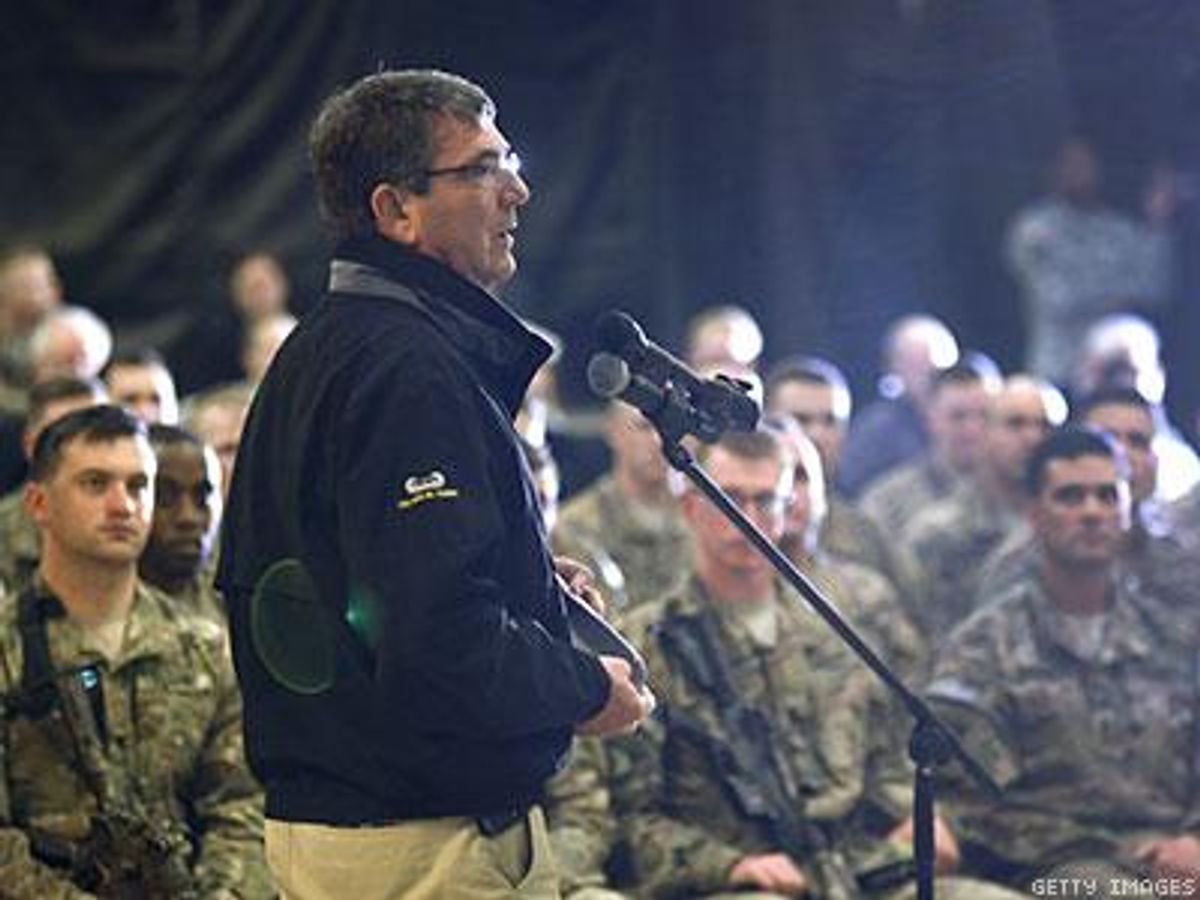Less than a week after he was sworn in, Defense Secretary Ashton Carter offered the most encouraging statements from a Pentagon official to date indicating a change in the longstanding military policy that bars transgender Americans from serving openly.
When he spoke to service members in Kandahar, Afghanistan, on Sunday, Carter's first on-record comments about the trans military ban seemed to indicate his support for revising the military regulation that currently forces transgender service members to hide their authentic identity or risk discharge.
"I come at this kind of question from a fundamental starting point, which is that we want to make our conditions and experience of service as attractive as possible to our best people in our country," Carter said in response to a question from a Navy Medical Care lieutenant commander who has cared for enlisted trans patients. "And I'm very open-minded about -- otherwise about what their personal lives and proclivities are, provided they can do what we need them to do for us. That's the important criteria. Are they going to be excellent service members? And I don't think anything but their suitability for service should preclude them."
On Monday morning, a spokesman for the White House said President Obama agrees with Sec. Carter that all Americans who are willing and able to serve should have the opportunity to do so, but declined to outline next steps, reports BuzzFeed News legal editor Chris Geidner.
"The president agrees with the sentiment that all Americans who are qualified to serve should be able to serve," said White House Press Secretary Josh Earnest. "And for that reason, we here at the White House welcome the comments from the secretary of defense. But in terms of -- of additional steps that the Department of Defense will take to address this matter, I'd refer you to the secretary's office."
Carter's remarks echo those of his predecessor, Chuck Hagel, who last May said he was "open" to reviewing the military medical regulation that declares a transgender identity or any gender-affirming clinical or surgical treatment to be evidence of a "psychosexual condition" that makes one unfit for service.
There are an estimated 15,500 transgender Americans currently serving in the U.S. Armed Forces, according to a 2014 study from the Williams Institute at the University of California, Los Angeles, School of Law. Advocates who want to see the military regulation changed -- which can be done at the discretion of the secretary of Defense, without congressional action -- were hopeful that Carter's statements and the White House's support are the first steps toward reviewing and ultimately rescinding the policy.
"To those familiar with how the military chain of command works, the Commander-in-Chief's intent could not be clearer: President Obama has done more to ensure transgender Americans are treated fairly and with respect than all those who've previously held the office combined,"said Allyson Robinson, former Army captain and director of policy at SPARTA, an association of LGBT service members, veterans, and their families that advocates for open trans service. "Good subordinate leaders take their commander's intent and execute -- they get the job done. That's what SPARTA's transgender members, their commanders, and their families are looking to Secretary Carter to do now."
Among the service members in the audience for the secretary's remarks was a transgender member of SPARTA, who must hide their identity or risk discharge, reports a SPARTA press release. "I wanted to tell him I'm one of those people serving in silence," the enlisted service member said. "I love my job, I'm supported and respected by the people I serve with, and I want to make the military a career. But until the [regulations] are updated, just speaking up for myself could end it all."
Several prominent studies have determined that there is "no compelling medical reason" to continue to deny open military service to transgender Americans, as a March study backed by a former U.S. Surgeon General and performed by the Palm Center concluded. Also, a nine-member commission, including several retired generals and flag officers, concluded a three-month study last August with the recommendation that changing the current regulations to allow trans citizens to serve openly would be "neither excessively complex or burdensome."
The Palm Center, which conducted two of those long-term studies, had a definitive answer to the question Carter posed in his response. A statement issued Monday by the independent San Francisco-based think tank reads, "In response to a question today about whether transgender troops can serve in austere environments, Secretary Carter asked, 'are they going to be excellent service members?' The answer to this question, based on the experiences of 15,500 transgender troops who are already serving, as well as academic research, is an unqualified yes,"
Indeed, 18 countries in Europe and elsewhere have already allowed trans citizens to serve openly without issue. Military commanders and veterans from several of those nations, including the United Kingdom, Norway, Sweden, Australia, and Canada, gathered in Washington, D.C., last October to participate in a first-of-its-kind conference titled Perspectives on Transgender Military Service From Around the Globe.



















































































Viral post saying Republicans 'have two daddies now' has MAGA hot and bothered